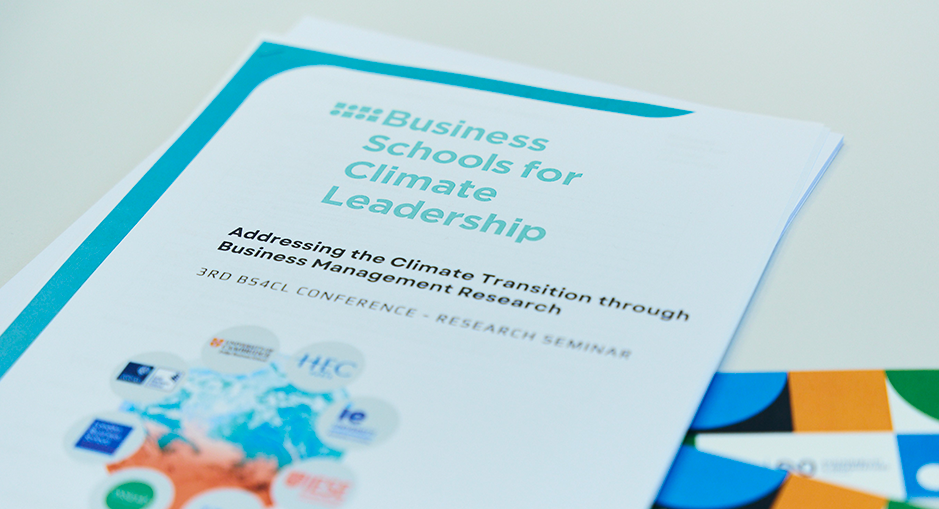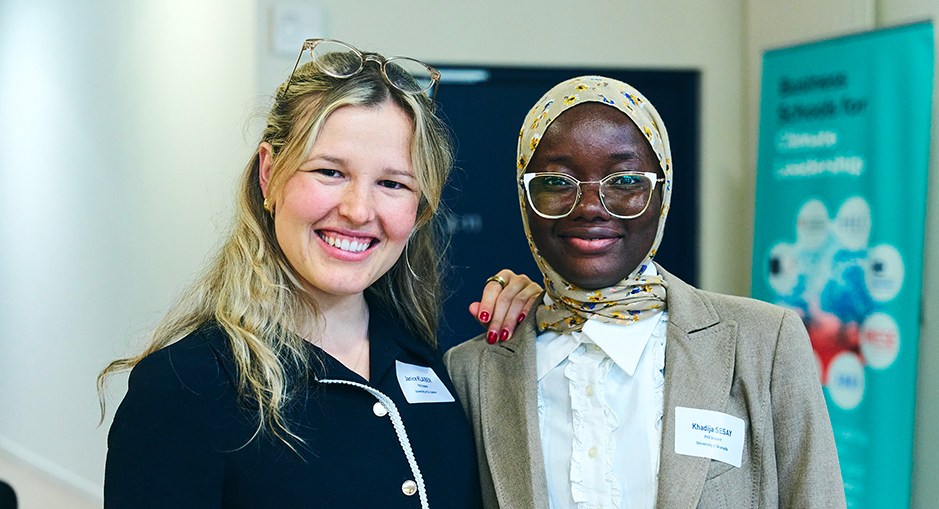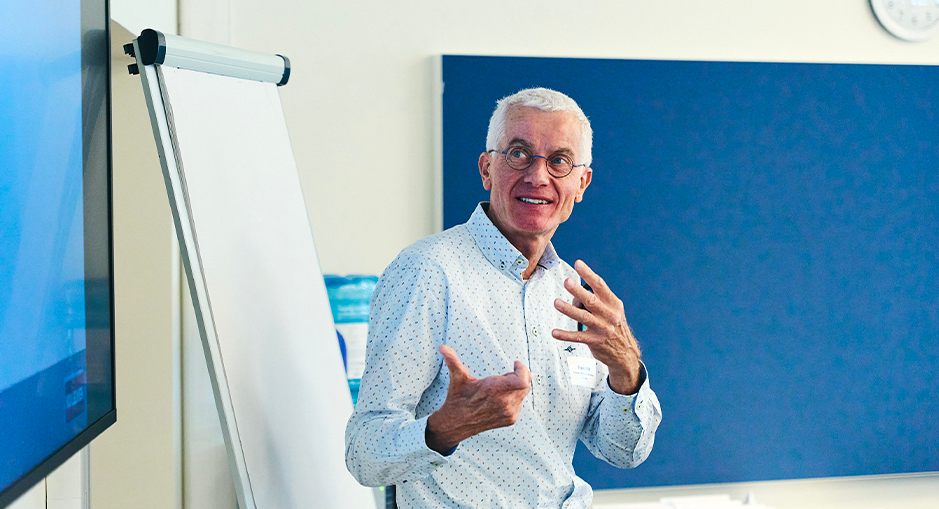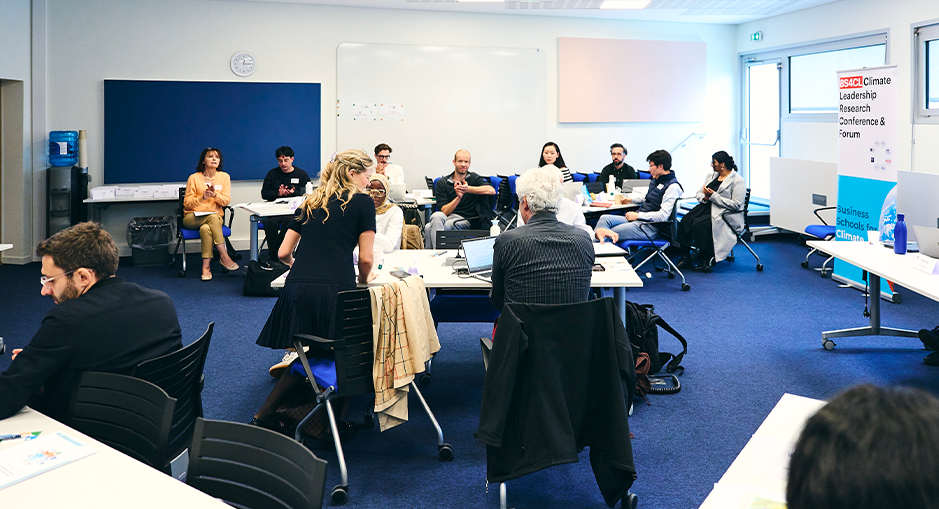Young Researchers Converge at HEC Paris to Rethink Climate Leadership
Business Schools for Climate Leadership convened young climate scholars to share research which is rethinking systems that underpin environmental performance.

Intimate Yet Impact-driven
The inaugural BS4CL PhD Academy at HEC Paris featured a new generation of climate scholars to present cutting-edge research bridging climate, business, and society. Their mission? To re-examine the world’s sustainability and CSR programs, finance, food, and resource governance and share their early insights in front of a panel of seasoned academics. Their method? To expose their early explorations in front of top academics who are to guide and advise their studies in the coming years.
Indeed, after a dozen exposés, the Academy concluded with mentoring sessions from BS4CL faculty, including professors Frank Wijen, Ali Shantia, Françoise Chevalier, Fernando J. Díaz López and moderated by Concepción Galdón Sanz-Pastor (IE Business School) and Fernanda Accorsi (IESE). These one-on-one exchanges helped participants refine their research questions, explore publication strategies, and consider the societal applications of their work.
“Climate change is no longer a side topic in business education,” emphasized Dr. Fernando Diaz Lopez, who’s also the Executive Director of the S&O Climate and Earth Center, as he welcomed PhD students from across Europe to this first-ever PhD Academy devoted to climate leadership and business schools. Held on May 27-28 at the Z Building on HEC’s campus, the seminar offered an intimate yet high-level environment for early-stage researchers to exchange insights, test their ideas, and gain critical feedback from academic mentors.
While the Academy featured a wide range of topics - from circular business models to stakeholder activism - four projects stood out for the way they tackled foundational systems in climate policy and business strategy.
Governing the Commons: Learning from the Past
For Marc Legrand, a PhD candidate in HEC’s strategy and business policy department, tackling climate change begins with understanding the legacies that shape collective action today. His research explores how infrastructure - like abandoned railroads in rural California - can become an invisible yet powerful driver of community cooperation.
“These legacies affect social networks across neighboring communities in California,” he explained. “Where there’s kinship or shared infrastructure, you often find more trust and collaboration when it comes to managing common resources like water.”
Legrand’s paper connects historical patterns to present-day governance challenges, showing how inclusive stakeholder engagement can be designed when institutional memory is acknowledged. Drawing inspiration from Robert Putnam and Elinor Ostrom, he urges policymakers to customize climate governance mechanisms rather than apply uniform templates: “What works in one place may not work in another. We need flexible models, tailored to specific contexts.”
Ruizhi Xu, representing IE Business School, offered a sobering look at climate risk in housing markets. His research dives into the uneven geography of climate vulnerability and its implications for insurance systems, zoning policies, and real estate pricing.
“Climate risk isn’t evenly distributed, and neither is resilience,” Xu noted. “Wealthier areas often bounce back quicker after shocks, but we still lack clear data on whether that’s due to proactive adaptation or structural privilege.”
His work urges insurers and developers to move beyond historic averages and factor in long-term environmental characteristics of regions. He recommends more granular, forward-looking risk models and calls on governments to revisit public insurance programs like FAIR (Fair Access to Insurance Requirements) to ensure coverage in high-risk zones. “Our goal should be to build not just for compliance, but for long-term climate resilience,” he said.
Marketing scholar Shemal Doshi
Shemal Doshi, from INSEAD, brought the lens of marketing and consumer behavior to the climate conversation with a deceptively simple question: When should carbon labels on food be mandatory?
“Many people think more labels equal more transparency,” Doshi said. “But if consumers don’t trust or understand what the label means - especially if emissions are unpredictable - then the label might do more harm than good.”
His study focuses on the concept of CO₂ predictability - how reliably consumers can estimate a product’s footprint. Through experiments with traffic-light carbon labels, Doshi analyzes how partial versus full labeling influences purchasing behavior. His findings offer nuanced insights for EU policymakers and retail brands considering mandatory climate labeling schemes. “It’s about timing and credibility,” he emphasized. “We shouldn’t rush mandates without ensuring they actually empower consumers to make better choices.”
Mapping Corporate Disclosure Under Public Pressure
Adding another critical layer to the conversation on corporate accountability was the paper presented by Jiamin Zhao, PhD researcher from IESE Business School. Her work, titled “Transparency Under Public Pressure: Local Activism, Stakeholder Rights, and Voluntary Disclosure”, examines how firms respond to grassroots activism and community-led scrutiny, especially when formal regulatory mechanisms fall short. Zhao explores the dynamics between local stakeholders and multinational corporations, analyzing how proximity, intensity of activism, and reputational risks drive shifts in voluntary disclosure practices.
In an age of increasing demands for ESG transparency, Zhao’s research sheds light on the non-financial pressures that shape corporate reporting. “What I find most compelling,” she explained during her presentation, “is how community actors - those often overlooked in global frameworks - can actually shape firm behavior in meaningful ways.” Her work connects with broader debates on stakeholder capitalism and the evolving nature of corporate legitimacy, especially in regions where trust in public institutions is low but social mobilization is high.
From Sierra Leone to Granada: Holding Investors Accountable
Staying in Spain, a powerful addition to this lineup of young researchers came with Khadija Sesay, a PhD researcher at the University of Granada. Originally from Sierra Leone, Sesay is investigating the influence of common ownership by institutional investors - like BlackRock or Vanguard - on corporate environmental performance.
“These big funds often hold shares in competing firms within the same industry,” she explained. “My question is: does this encourage or dilute environmental responsibility?”
Sesay’s work touches on ownership structures, disclosure mandates, and global asymmetries in climate regulation. Her unique trajectory - from studying accounting in Freetown to international management in Barcelona and now doctoral research in Granada - also informs her perspective. “In Africa, we’re among the most impacted by climate change but the least responsible for it. That drives my interest in how capital is deployed, and who it benefits,” she said.
Sesay also reflected on how West African practices around reuse and informal recycling could inform more sustainable consumption patterns globally. “We don’t throw things away easily. That mindset could be part of the solution.”
The BS4CL Academy also gave the floor to Janice Klaiber of the University of St. Gallen and HEC alumnus 2022, whose project examines how CEOs and CFOs can integrate natural capital into corporate strategy. Based on interviews with financial leaders and sustainability officers in industrial firms, she’s developing new tools to help business leaders value biodiversity, water cycles, and ecosystem services as core business assets - not externalities.
“Too often, nature is treated as infinite,” Klaiber explained. “We need to understand its limits, and translate those into strategic decisions, financial forecasts, and risk assessments.”
She sees business schools as having a unique role to play. “We have to equip the next generation of managers to see nature as part of their P&L,” she said. “Not as charity, but as strategy.”
Building a Community of Research and Purpose
As the workshop underlined, the climate crisis is not just scientific; it's organizational, cultural, and managerial. The participants acknowledged that business schools have lagged behind but, according to its organizers, BS4CL’s PhD Academy hopes to change the narrative. For this, they maintained, scholars must answer the challenge of scaling research impact beyond journals - into policymaking, business education, and public discourse. For the academic mentors and organizers, the students attending represent a new epistemic vanguard of business and climate.
However, the PhD Academy was not just a platform for peer learning. It was also an intergenerational dialogue. A highlight of the program was the keynote by Professor Frank Wijen (KU Leuven), who reminded attendees that intellectual courage must accompany technical competence.
“Too much of today’s sustainability research plays it safe,” Wijen argued in his lecture. “We need bold, creative work that challenges assumptions - both in theory and in practice.”
His call was echoed in smaller mentoring sessions where senior faculty helped participants sharpen their research questions, explore publication strategies, and consider the societal applications of their work.
Building a Transnational Network
The broader goal, emphasized by HEC director Fernando J. Díaz López, is to build a pan-European research network committed to the climate transition - not only across disciplines, but across borders and lived experience. And he’s ideally placed as the Associate Professor Extra-ordinary of Sustainability Systems at Stellenbosch University. Organized by HEC’s S&O Climate and Earth Center - in collaboration with the rest of the BS4CL partners (Cambridge Judge Business School, HEC Paris, IE Business School, IESE Business School, the International Institute for Management Development IMD, INSEAD, London Business School, and Saïd Business School at the University of Oxford - the Academy is envisioned as an annual event. Its goal is not only to support early-career researchers but to build a transnational network of climate-focused business scholars who will reshape what business schools teach, measure, and value.
“It’s easy to feel isolated in a PhD,” Sesay reflected. “But here, I saw how my work connects to others’. We’re fighting different battles, but for the same planet.” As the event wrapped up, Klaiber summed up the collective mood: “We’re not just studying change - we’re part of it. And we need to build institutions that reflect that.”



